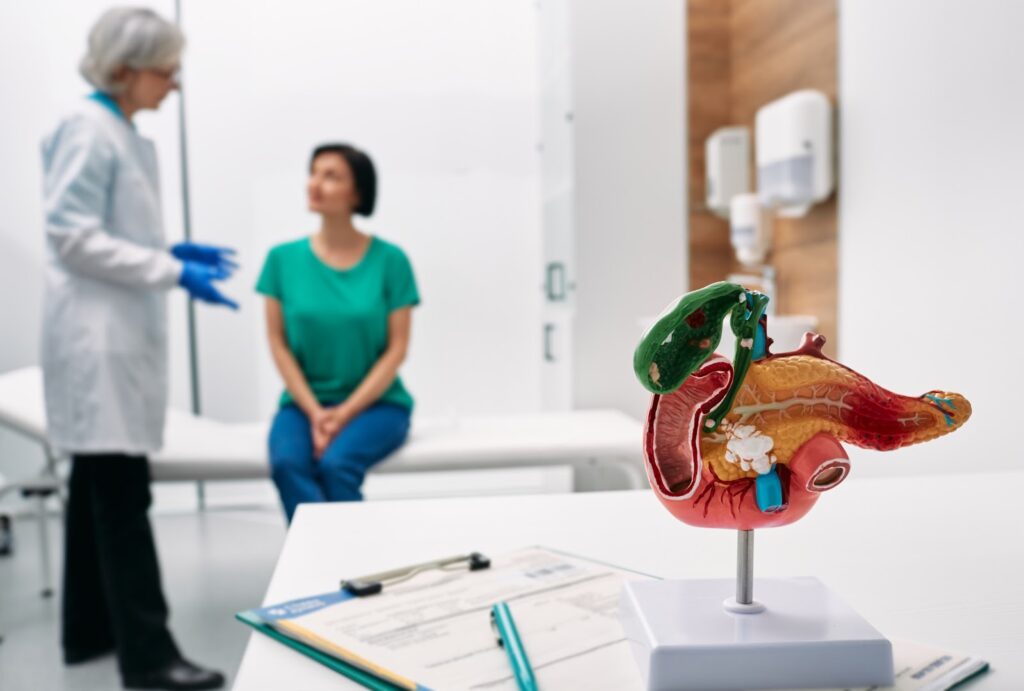Stomach Cancer Awareness Month: Learn More from DHC

November is Stomach Cancer Awareness Month – Learn More
Our gastroenterologists at Digestive Healthcare Center are dedicated to keeping our patients informed about all facets of digestive health, including certain conditions that can cause gastrointestinal symptoms. Stomach cancer, also known as gastric cancer, affects both men and women in the United States. According to the American Cancer Society, about 26,000 people are diagnosed with stomach cancer in the United States each year. The stomach is a crucial part of the digestive system – it is where food is digested before it is emptied into the first part of the small intestine. Stomach cancers can grow very slowly over several years – this cancer often starts as precancerous changes in the inner lining of the stomach. Since these early changes rarely cause symptoms, they may go undetected until cancer has formed. The symptoms, prognosis, and treatment of stomach cancer often depend on where exactly it is located. November is Stomach Cancer Awareness Month – keep reading to learn more about this condition from Digestive Healthcare Center.
What are the Symptoms of Stomach Cancer?
Early-stage stomach cancer rarely causes symptoms. In the United States, there is no suggested screening routine for this disease since it is not among the more common cancers. Since it is not particularly common in the U.S., the benefits of widespread screening would not outweigh the possible harms. Because of this, most people are not diagnosed with stomach cancer until symptoms are present. When symptoms occur, they often include:
- Poor appetite/feeling full quickly
- Losing weight without trying
- Abdominal pain and/or discomfort
- Bloating
- Nausea and vomiting
- Difficulty swallowing
- Heartburn
- Indigestion
Risk Factors of Stomach Cancer
Certain risk factors can increase an individual’s risk of developing stomach cancer. As with any disease, some risk factors can be controlled while others cannot.
- Gender – Men are more likely to develop stomach cancer than women.
- Age – The risk of developing stomach cancer increases as people get older. Most cases are diagnosed in the 60s, 70s, and 80s.
- Ethnicity – Stomach cancer is more common among Hispanic Americans, African Americans, and Asian/Pacific Islanders in the United States.
- H pylori infection – Long-term infection with Helicobacter pylori can lead to the development of pre-cancerous changes in the inner lining of the stomach.
- Being overweight or obese
- Alcohol and tobacco use
- Certain inherited cancer syndromes
- Hereditary diffuse gastric cancer (HDGC)
- Lynch syndrome
- Familial adenomatous polyposis (FAP)
- Gastric adenoma and proximal polyposis of the stomach (GAPPS)
- Li-Fraumeni syndrome
- Peutz-Jefgers syndrome (PJS)
Although there is not a comprehensive screening program for stomach cancer in the United States, those with certain risk factors may benefit from regular screening. This includes those with pre-cancerous stomach conditions or inherited conditions that put them at greater risk, such as Lynch syndrome. For these individuals, upper endoscopy at regular intervals may be recommended.
How Is Stomach Cancer Diagnosed in New Jersey?
The path towards a stomach cancer diagnosis often begins with a physical exam. Blood tests may also be ordered to check for anemia, which can be caused by the cancer bleeding into the stomach. Your doctor may also check for blood in the stool. The most common diagnostic test for stomach cancer is upper endoscopy. During the test, a thin, flexible tube with a light and a camera on the end is passed down the esophagus and allows your doctor to see the inner lining of the esophagus, stomach, and first part of the small intestine. Biopsies can be taken of abnormal areas and then checked for cancer. During the diagnostic process, other imaging tests, such as endoscopic ultrasound, may be used. These tests can determine if cancer has spread.
Treatment for Stomach Cancer in NJ
There are several different types of treatment for stomach cancer. Your doctor will consider your unique situation when determining which method of treatment will be best. Factors such as the location and stage of the cancer are an important part of this decision, as well as your age, overall health, and personal preferences. Common treatment methods for stomach cancer include:
- Surgery
- Chemotherapy
- Targeted Drug Therapy
- Immunotherapy
- Radiation Therapy
Get Involved During Stomach Cancer Awareness Month
Stomach Cancer Awareness Month was officially designated in 2010 and is fitting for November because of the large focus on eating during this month. Although stomach cancer is not very common in the United States, it is the fifth most common cancer worldwide and the third most common cause of cancer death. Stomach Cancer Awareness Month is focused on raising awareness of this disease, along with supporting efforts to educate people about stomach cancer, focusing on the need for funding and research into early diagnosis and treatment, raising funds for research, and promoting public awareness surrounding stomach cancer and digestive health. If you or someone you love has been affected by stomach cancer, we encourage you to talk about your experience and help raise awareness so others can more easily recognize the symptoms. Early detection is key to saving lives, and although early detection can be difficult when it comes to stomach cancer, spreading awareness makes an impact.
Comprehensive Gastroenterology Care in New Jersey
At Digestive Healthcare Center, our physicians are dedicated to promoting the positive digestive health of our patients and those throughout New Jersey. We are proud to provide a wide array of tests and procedures to diagnose and treat all manner of digestive health conditions. Whether you choose to visit one of our gastroenterology centers in NJ or speak to one of our physicians via a virtual telemedicine visit, we will put your digestive health first and determine a personalized care plan for you. If you are experiencing symptoms that cause you discomfort or concern, please don’t hesitate to contact us today to schedule an appointment. We look forward to helping you stay on top of your gastroenterological health and live a more comfortable life.
Make an Appointment for Comprehensive Digestive Care in NJ
At Digestive Healthcare Center, we want each patient at our three offices in New Jersey to feel confident about their digestive health. We encourage you to contact us today to make an appointment with one of our expert gastroenterologists – don’t wait to start putting your digestive health first!
Recent Blogs
Learn more about all things digestive health and wellness by checking out our recent gastroenterology blogs.

Diverticular disease and diverticulitis are related digestive health conditions that affect the large intestine (colon). With diverticular disease, small, bulging pockets develop on the lining of the colon. When these pockets become inflamed or infected, the condition is called diverticulitis. They are very common – especially after age 40 – and rarely cause problems. At […]

Many Americans like to set New Year’s resolutions to make positive lifestyle changes such as improving their diet and going to the gym. However, March is also a great time for a healthy focus, especially as the long winter season comes to an end. National Nutrition Month, sponsored by the Academy of Nutrition and Dietetics, […]

Gallstones form when bile stored in the gallbladder hardens. Your gallbladder is a small, pear-shaped organ on the right side of your abdomen, just beneath your liver. It holds a digestive fluid called bile that’s released into your small intestine. Gallstones are pebble-like pieces of concentrated bile material, typically made up of cholesterol or bilirubin […]
























